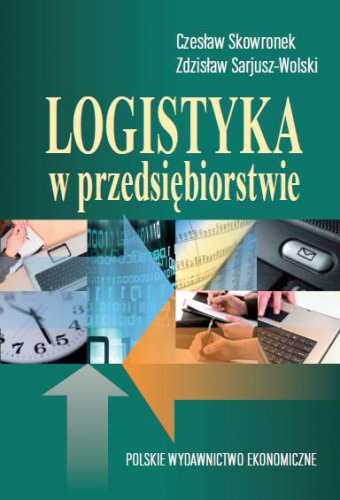Logistyka w przedsiębiorstwie
Publication date: 2012
Place publication: Warszawa
Publication: V zmienione
Binding: paperback
Format: 162x237
Logistics is a sphere of business activity that mainly deals with tangible and information processes of flow of material products within an enterprise as well as between business entities. The streams of flow are the element that brings the entirety of phenomena and logistical processes together.
Management of these processes, understood as the whole, also belongs to the domain of logistics. At the same time, logistics is an area of knowledge which examines phenomena and processes related with transport, warehousing, stock development and other activities and provides business practice with appropriate methods and measures to control these processes.
Over the recent the world of science, and in particular that of business practice have revealed an increased interest in problems of logistics. Globalization of the commodities and services markets as well as revolutionary transformations in technologies of communication have confronted businesses with the need to ensure prompt, efficient and reliable delivery streams that are critical in maintaining the essential continuity of business processes.
The proficiency of logistical processes, application of modern instruments of their control, the ability to make business activity more economical and achieve reduction of logistical costs are essential prerequisites for maintaining any company’s market position or achieving a competitive advantage.
The fifth edition of “Logistics in an enterprise” is published sixteen years after the first edition. These years were the period of dynamic changes in the economy, especially on the global scale, with significant influence, among other things, upon logistical processes. In 1995 the first edition of the book was also one of the first publications appearing on the Polish market, dedicated to problems of logistical processes in an enterprise.
In its present form the book consists of thirteen chapters providing an ordered and logical discussion of the fundamental problems in the area of logistics in an enterprise. Data quoted in the book relate to the year 2009 and were mainly taken from the 2010 Yearbook of Statistics, published in early 2011. The Polish economy — developing under strong influence of the global economy — has recently undergone dynamic changes. The global economic and financial crisis of 2008-2009 also had its impact upon our country. The Authors paid due attention to these phenomena and events, as far as they had an echo in the area of logistics.
Both the contents of the book and the concept of its presentation suggest this is neither a classic monograph, nor just an academic manual. Actually, the book has attributes of both these types of publications. It may be used by students, in particular of studies related with economics, management and marketing in any type of university, but it may also be of interest to business practitioners.
SPIS TREŚCI
OD AUTORÓW
1. ISTOTA I PRZEDMIOT LOGISTYKI
1.1. Pojęcie i istota logistyki
1.2. Powstanie i Rozwój logistyki
1.3. Strumienie oraz zasoby rzeczowe i informacyjne jako przedmiot logistyki
1.4. Mikro- i makroekonomiczna treść logistyki
2. ROLA LOGISTYKI W KSZTAŁTOWANIU EKONOMIKI PRZEDSIĘBIORSTWA
2.1. Logistyka i jej związek z celami przedsiębiorstwa
2.2. Logistyka — wsparciem strategii przedsiębiorstwa
2.3. Logistyka a płynność finansowa przedsiębiorstwa
2.4. Logistyka a efektywność przedsiębiorstwa
3. MAKROEKONOMICZNE UWARUNKOWANIA PROCESÓW LOGISTYCZNYCH W PRZEDSIĘBIORSTWIE
3.1. Makroekonomiczne problemy polskiej gospodarki i logistyki
3.1.1. Polska w Unii Europejskiej
3.1.2. Finanse publiczne
3.1.3. Sektor przedsiębiorstw
3.1.4. Skutki dla logistyki
3.2. Rynek a procesy logistyczne
3.3. System zarządzania a procesy logistyczne
3.4. Bezpośrednie instrumenty oddziaływania państwa na procesy logistyczne
3.5. Struktura podmiotowa gospodarki a procesy logistyczne
3.6. Poziom i struktura zapasów rzeczowych
3.7. Wyzwania informacyjne a logistyka w przedsiębiorstwie (e-gospodarka)
4. INFRASTRUKTURA PROCESÓW LOGISTYCZNYCH
4.1. Pojęcie infrastruktury procesów logistycznych
4.2. Infrastruktura transportowa
4.3. Infrastruktura magazynowa i manipulacyjna
4.4. Opakowania jako składnik procesów logistycznych
4.5. Infrastruktura informatyczna
5. PROCESY LOGISTYCZNE W PRZEDSIĘBIORSTWIE
5.1. Typy przedsiębiorstw z punktu widzenia logistyki
5.2. Podsystemy logistyczne przedsiębiorstw
5.3. Strumienie przepływów rzeczowych i informacyjnych
5.4. Struktura przepływów rzeczowych
5.5. Logistyka w strukturach zarządzania przedsiębiorstwem
5.6. Przedsiębiorstwo logistyczne
5.7. Centra logistyczne
6. PROCESY MAGAZYNOWANIA, MANIPULACJI I TRANSPORTU WEWNĘTRZNEGO W PRZEDSIĘBIORSTWIE
6.1. Rola i funkcje magazynowania, manipulacji i transportu wewnętrznego w przedsiębiorstwie
6.2. Organizacja procesów magazynowych
6.3. Systemy informatyczne
6.4. Projektowanie transportu wewnętrznego
7. STEROWANIE PROCESAMI ZAKUPU
7.1. Znaczenie procesów zakupu
7.2. Podstawowe funkcje procesów zakupu
7.2.1. Identyfikacja funkcji
7.2.2. Baza informacyjna procesów zakupu
7.3. Planowanie potrzeb materiałowych
7.3.1. Rodzaje potrzeb (popytu)
7.3.2. Sprzężenia informacyjne w planowaniu potrzeb materiałowych
7.3.3. System planowania potrzeb materiałowych (MRP)
7.4. Wybór źródeł zakupu
7.5. Organizacja dostaw
7.6. Przypadki szczególne w fazie zakupów
7.6.1. Opusty cenowe
7.6.2. Czynnik inflacji w polityce zakupów
7.6.3. Zakupy w sytuacji nieciągłości potrzeb
7.6.4. Zarządzanie zakupami w przypadku gdy koszty tworzenia zapasów ponosi dostawca
8. LOGISTYKA PROCESÓW PRODUKCJI
8.1. Typowe modele przepływów produkcji
8.2. Sterowanie przepływami produkcji w różnych typach produkcji
8.3. Nowoczesne metody sterowania przepływami produkcji
8.4. Optymalna partia produkcji
9. LOGISTYKA PROCESÓW DYSTRYBUCJI
9.1. Zakres i przedmiot logistyki procesów dystrybucji
9.2. Prognozowanie popytu
9.2.1. Podstawowe modele (metody) prognozowania popytu
9.2.2. Prognozowanie popytu z wykorzystaniem modeli adaptacyjnych
9.2.3. Prognozowanie przyczynowo-skutkowe
9.2.4. Prognozowanie intuicyjne
9.3. Kanały dystrybucji
9.4. Warianty organizacji procesów dystrybucji
9.4.1. Eliminacja ogniw pośrednich
9.4.2. Lokalizacja hurtowni
9.4.3. Przykłady nowoczesnych systemów dystrybucji
9.4.4. Optymalizacja powiązań transportowych
10. STEROWANIE ZAPASAMI W PROCESACH LOGISTYCZNYCH
10.1. Istota, funkcje i czynniki kształtowania zapasów
10.2. Struktura zapasów i ich podatność na sterowanie
10.3. Metody (modele) sterowania zapasami
10.4. Wybrane decyzje logistyczne w sferze zapasów
10.4.1. Sterowanie zapasami w warunkach ograniczonego kapitału obrotowego
10.4.2. Uwzględnianie kosztu braku zapasu
10.4.3. Dwuszczeblowe sterowanie zapasami
11. KOSZTY LOGISTYCZNE
11.1. Pojęcie i zakres kosztów logistycznych
11.2. Przekroje strukturalne kosztów logistycznych
11.3. Czynniki kształtowania i redukcji kosztów logistycznych
11.3.1. Charakterystyka i podział czynników
11.3.2. Koszty fizycznego przepływu materiałów
11.3.3. Koszty zapasów
11.3.4. Koszty procesów informacyjnych
11.4. Poziom i struktura kosztów logistycznych
11.5. Budżetowanie kosztów logistycznych
12. ANALIZA EKONOMICZNA PROCESÓW LOGISTYCZNYCH
12.1. Przedmiot analizy
12.2. Metody analizy
12.3. Analiza procesów zakupu
12.3.1. Zakres analizy
12.3.2. Analiza wielkości, dynamiki i struktury zakupu
12.3.3. Analiza wpływu cen zakupu na koszty działalności
12.3.4. Analiza organizacji procesów zakupu w przedsiębiorstwie
12.4. Analiza zapasów
12.4.1. Analiza wielkości i struktury zapasów
12.4.2. Wskaźniki produktywności zapasów
12.5. Analiza procesów magazynowych
12.6. Analiza procesów sprzedaży
12.7. Analiza kosztów logistycznych
12.7.1. Przedmiot analizy
12.7.2. Analiza wstępna kosztów logistycznych
12.7.3. Analiza szczegółowa kosztów logistycznych
12.8. Analiza wpływu procesów logistycznych na rentowność
13. PODSTAWOWE TENDENCJE ROZWOJOWE LOGISTYKI
13.1. Nowe zjawiska w gospodarce europejskiej i Światowej oraz ich wpływ na logistykę
13.2. Rozwój eurologistyki
13.3. Rozwój logistyki w przedsiębiorstwach
13.4. Rozwój systemów informacyjnych logistyki
13.4.1. Podstawowe funkcje informacyjne
13.4.2. Kompleksowe programy komputerowe
13.4.3. Tendencje rozwojowe systemów informatycznych
BIBLIOGRAFIA
| Odbiór osobisty | 0 € |
| Inpost Paczkomaty | 4 € |
| Kurier Inpost | 4 € |
| Kurier FedEX | 4 € |
| Free delivery in Reader's Club | from 47 € |


